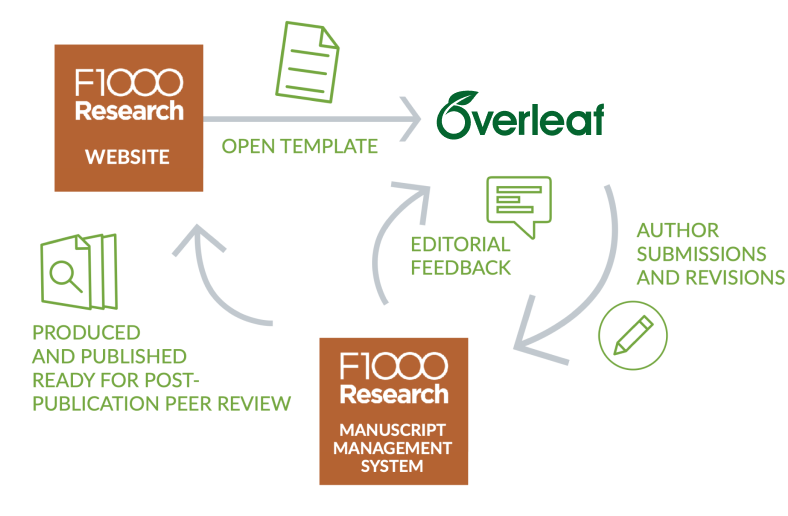Publisher F1000Research attracts target authors with Overleaf
Customized LaTeX templates and a simplified submission process make it even easier to publish on the innovative open research platform.

Many bioinformaticians and biologists who use computational models have told us that they generally prefer using the LaTeX format over [Microsoft] Word. By working with Overleaf, we can offer this group of authors an alternative to Word, and this helps improve their overall experience with F1000Research.
—Michaela Torkar, Editorial Director, F1000 Research
At a glance
F1000Research is an open research publishing platform for scientists, scholars, and clinicians that offers rapid publication of articles without editorial bias. Its authors typically use LaTeX to format articles, yet it was challenging for F1000 to accept submissions in this format. The platform did not provide LaTeX templates and had limited LaTeX author support. F1000 wanted to improve the process and make it more user-friendly for authors.
The solutionOverleaf developed custom LaTeX article templates for F1000Research that authors can easily access from the F1000Research website. This allows authors to write in the correct style and format, collaborate with colleagues through Overleaf’s cloud-based authoring tool and then submit their finished article with one click to F1000Research. Now, approximately 10 to 15% of all F1000’s submissions come in via the Overleaf template and submission link.
ProductOverleaf Link
Improving the submission experience for authors
F1000Research publishes articles and other outputs on scientific, scholarly, translational and clinical research across physical and life sciences, engineering, medicine, social sciences, and humanities. Its author-led process involves rapid publication of research with peer review of articles conducted after publication.
Scholars from the fields of bioinformatics and genomics have particularly embraced F1000’s unique publishing model. However, prior to using Overleaf, it was difficult for F1000Research to accept LaTeX as a form of submission. Knowing that their users generally prefer LaTeX to format articles and do graphical notation, F1000’s editorial team wanted to improve author experience for LaTeX users.
An integrated editorial process
Overleaf is now offered to authors to ease the writing and submission process to F1000Research. Overleaf developed custom LaTeX article templates for the publisher that authors can quickly and easily open from within the F1000Research author guidelines website. This allows authors to effortlessly write in the correct style and format, collaborate with colleagues through Overleaf, and then submit their finished article directly from Overleaf to F1000Research.
From there, Overleaf is integrated into the F1000Research editorial process, allowing editors to efficiently review and update the article, submit changes back to the author with one click, and collaborate with the author on suggested article updates and changes.
F1000Research uses an author-led process, publishing all scientific research within a few days. Open, invited peer review of articles is conducted after publication, focusing on scientific soundness rather than novelty or impact.
The publishing workflow is as follows: An author submits an article for publication. The editors check the submission against F1000Research editorial criteria and then they work with the author to get the article into the correct format to be published. For most LaTeX submissions, this is done through the Overleaf editorial workflow.
The peer review process begins once the article has been published. The F1000 team checks that the methods are described sufficiently for referees to assess them and to confirm that the source data supporting the presented results is included. The team also ensures that the article metadata is correct. The metadata is transferred automatically from Overleaf during the submission process, meaning no new data entry is required.
“Many bioinformaticians and biologists who use computational models have told us that they generally prefer using the LaTeX format over [Microsoft] Word,” said Michaela Torkar, Editorial Director, F1000 Research. “By working with Overleaf, we can offer this group of authors an alternative to Word, and this helps improve their overall experience with F1000Research.”
We don’t promote one [LaTeX] tool over the other, but our authors typically choose Overleaf.
—Michaela Torkar, Editorial Director, F1000 Research
The LaTeX tool of choice
F1000Research now has a customized LaTeX article template, a simple LaTeX submission and editorial process, and even LaTeX author technical support. They receive 10 to 15% of all submissions via the Overleaf submission link.
F1000’s editorial director Michaela Torkar says they also offer authors the option to submit articles through another cloud-based LaTeX tool, but they have received very few submissions this way. She adds: “We don’t promote one tool over the other, but our authors typically choose Overleaf.”
Read more customer stories

Discover how Overleaf is powering thousands of collaborations at one of the world’s foremost research organizations.

The leading UK university more than quadrupled the number of institutions with which it collaborates and saw a 310% jump in new projects.

Ontario Tech’s Vialab group saves ‘significant’ time writing, editing, and collaborating.
Discover Overleaf for organizations
Join over 8,900 leading businesses and research institutions writing smarter with Overleaf.
